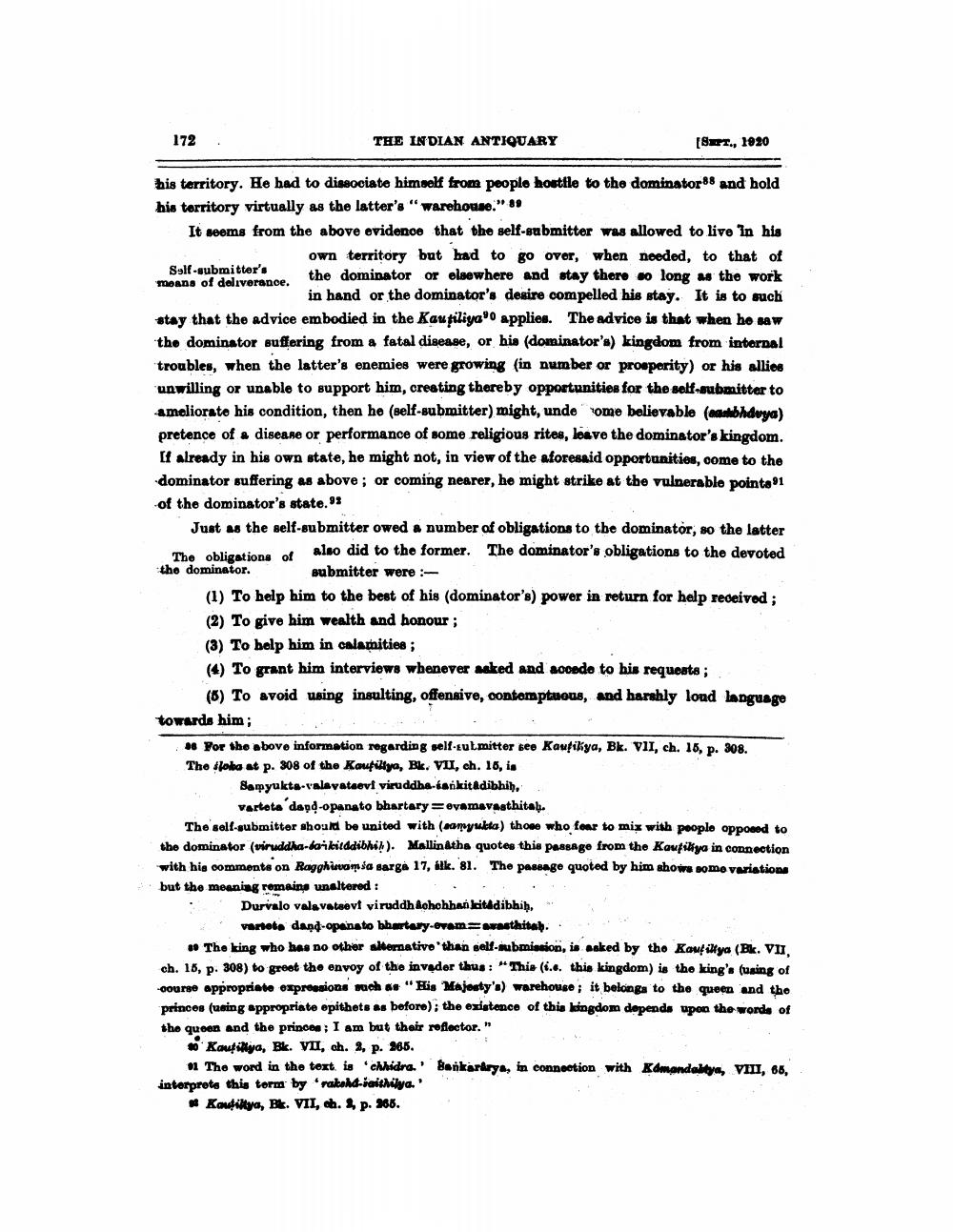________________
172
THE INDIAN ANTIQUARY
[ 8r., 1920
his territory. He had to dissociate himself from people hostile to the dominator 88 and hold his territory virtually as the latter's " warehouse." 89 It seems from the above evidence that the self-submitter was allowed to live in his
own territory but had to go over, when needed. to that of Solf-submitter's moans of deliveranoe.
the dominator or elsewhere and stay there so long as the work
in hand or the dominator's desire compelled his stay. It is to such stay that the advice embodied in the Kauriliya' applies. The advice is that when he saw the dominator suffering from a fatal disease, or his (dominator's) kingdom from internal troubles, when the latter's enemies were growing (in number or prosperity) or his allios unwilling or unable to support him, creating thereby opportunities for the self-submitter to ameliorate his condition, then he (self-submitter) might, unde vome believable (tbhduya) pretence of a diseane or performance of some religious rites, leave the dominator's kingdom. It already in his own state, he might not, in view of the aforesaid opportunities, come to the dominator suffering as above; or coming nearer, he might strike at the vulnerable pointa 1 of the dominator's state."
Just as the self-submitter owed a number of obligations to the dominator, so the latter The Ohliention of also did to the former. The dominator's obligations to the devoted the dominator. submitter were :
(1) To help him to the best of his (dominator's) power in return for help received ; (2) To give him wealth and honour; (3) To help him in calamities; (4) To grant him interviews whenever asked and accede to his requests;
(8) To avoid using insulting, offensive, contemptuous, and harshly loud language towards him;
. # For the above information regarding self-cut mitter tee Kaufikya, Bk. VII, ch. 16, p. 308. The lobo at p. 308 of the Kaufiltya, Bk. VII, ch. 18, is
Samyukta-valavatsevi viruddha-iarkitadibhih.
vartota dard-opanato bhartery=evamavasthitah. The self-submittor should be united with anyukta) those who fear to mix with people opposed to the dominator (viruddha-baikitddibhir). Mallin&tha quotes this passage from the Kaufiliya in connection with his comments on Ragghiwamsa sarga 17, ilk. 81. The passage quoted by him shows some variations but the meaning remains unaltered : . Durvalo valavatsevt viruddh Achchha loitadibhih.
vanota dagd-opanato bhartary-evam=smasthitah.. * The king who has no other alternative than self-submission, is asked by tho Koufiltya (Bk. VII. ch. 16, p. 308) to greet the envoy of the invader thus : "This (i... this kingdom) is the king's uning of course appropriate expressions such as "His Majesty's) warehouse ; it belongs to the queen and tho princes (using appropriate epithets as before); the existence of this kingdom depends upon the words of the queen and the princos; I am but their reflector." #0 Kautilya, Bk. VII, ch. 2, p. 865.
The word in the text is chhidra.' Bankarirya, in connection with Kamandaliya, VIII, 66, intorprote this torm by rakend-vaithilya.
# Kautilya, B. VII, ..p. 366.




